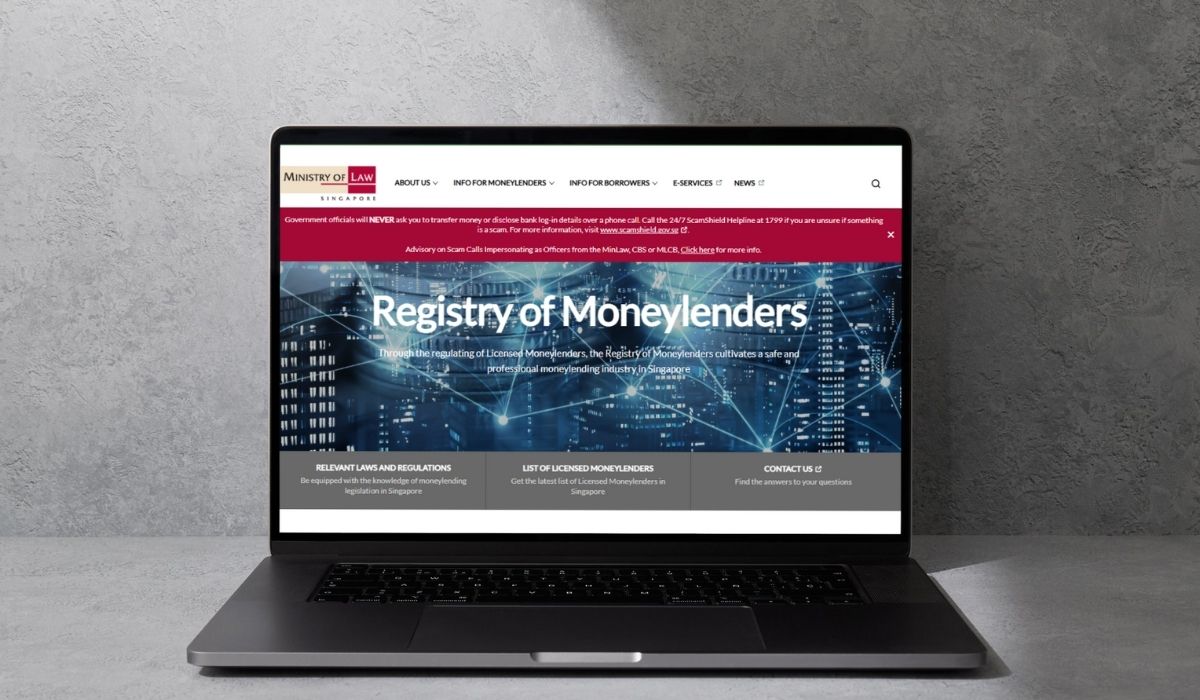Thinking about taking a loan from a moneylender but not sure if they’re legitimate? You’re right to be cautious. With loan sharks still operating in Singapore, knowing how to verify a licensed moneylender could save you from serious financial trouble.
The good news is that the Ministry of Law (MinLaw) maintains an official registry of all licensed money lenders in Singapore. Checking this list takes less than five minutes and is completely free.
Let’s walk through exactly how to use the MinLaw Registry to protect yourself.
Key Takeaways
- The MinLaw Registry lists all 145 licensed moneylenders in Singapore
- Checking the registry takes under 5 minutes and is free
- Licensed moneylenders can only charge maximum 4% interest per month
- If a moneylender isn’t on the registry, they’re operating illegally
- Licensed moneylenders cannot charge upfront fees or meet you outside their registered office
Why Verifying Your Moneylender Matters
Before we get into the how-to, let’s talk about why this matters.
Unlicensed moneylenders, commonly known as loan sharks, don’t follow any rules. They can charge whatever interest they want, harass you and your family, and use illegal collection methods that can turn your life upside down.
Licensed moneylenders, on the other hand, must follow strict regulations set by MinLaw. They face heavy penalties if they step out of line, which means you’re protected.
The MinLaw Registry is your first line of defence. If a moneylender isn’t on this list, walk away immediately.
What Is the MinLaw Registry of Moneylenders?

The Registry of Moneylenders is an official database maintained by the Ministry of Law. It’s a searchable list of every company that’s been approved to lend money legally in Singapore.
The registry is updated regularly when licences are granted, renewed, or revoked. As of 2025, there are approximately 145 licensed moneylenders operating in Singapore.
Anyone can access this registry for free on the MinLaw website. No registration or login required.
How to Check the Registry of Moneylenders: Step-by-Step

Step 1: Visit the Registry of Moneylenders
Go to the Registry of Moneylenders website at https://rom.mlaw.gov.sg/. Make sure you’re on the correct government website (look for “.gov.sg” in the URL).
You can also search “MinLaw Registry of Moneylenders” on Google, but always verify you’re on the official site.
Step 2: Navigate to the Registry
On the Registry of Moneylenders homepage, look for the “List of Licensed Moneylenders in Singapore”.
The direct link is usually: https://rom.mlaw.gov.sg/information-for-borrowers/list-of-licensed-moneylenders-in-singapore/
Step 3: Search for the Company
You’ll see a searchable database of all licensed moneylenders. You can either scroll through the alphabetical list or use the search function to find a specific company.
Enter the exact company name the moneylender gave you.
Step 4: Verify the Details Match
Once you find the company, check these details carefully:
- Company name (must match exactly, including any Pte Ltd or other suffixes)
- Licence number
- Registered office address
- Licence status (must show “Active”)
Step 5: Cross-Check Everything
Compare what’s on the registry with what the moneylender told you. Everything should match perfectly. If the company name is slightly different, the address doesn’t match, or the licence shows as expired or suspended, don’t proceed.
Even small discrepancies are red flags.
Red Flags: Signs of an Unlicensed Moneylender
Even after checking the registry, stay alert for these warning signs.
1. They’re Not on the Registry
This is the most obvious one. If you can’t find them on the MinLaw Registry after searching thoroughly, they’re operating illegally. No exceptions.
2. They Want to Meet Outside Their Office
Licensed moneylenders must conduct all business from their registered office address. If they suggest meeting at a coffee shop, HDB void deck, or your home, that’s illegal.
3. They Ask for Upfront Fees
Licensed moneylenders cannot charge any fees before approving and disbursing your loan. If someone asks for “processing fees”, “admin fees”, or any upfront payment, it’s a scam.
4. They Contact You First
Licensed moneylenders have strict advertising rules. They won’t send you unsolicited WhatsApp messages, call you randomly, or approach you in person.
5. They Want Your Passwords
No legitimate moneylender will ever ask for your SingPass password, online banking credentials, or ATM PIN. This is always a scam.
6. They Pressure You to Decide Quickly
Licensed moneylenders must give you time to read and understand your contract. High-pressure tactics like “this offer expires today” are warning signs.
What Documents Should a Licensed Moneylender Ask For?
When you apply for a loan with a licensed moneylender, they’ll typically request:
- Your NRIC
- Recent payslips or proof of income
- Bank statements (usually last 3 to 6 months)
- CPF contribution statements
- Proof of address
- Information about existing debts and loans
They should explain everything clearly and give you a written contract to review before you sign. Never sign anything you don’t fully understand.
If you’re considering a loan to manage existing debts, you might want to read our guide on paying off credit card debt with a personal loan to see if that makes sense for your situation.
Licensed vs Unlicensed Moneylenders: Key Differences
| Feature | Licensed Moneylenders | Unlicensed Moneylenders (Loan Sharks) |
|---|---|---|
| MinLaw Registry | Listed on official registry | Not listed |
| Interest Rate | Maximum 4% per month | Unlimited, often extremely high |
| Operating Location | Registered office only | Anywhere (coffee shops, void decks) |
| Upfront Fees | Not allowed | Often demanded |
| Collection Methods | Legal procedures only | Harassment, threats, vandalism |
| Borrower Protection | Regulated by law | None |
| Advertising | Restricted methods only | Illegal flyers, spam messages |
What If You’ve Already Borrowed from a Loan Shark?
If you realise you’ve borrowed from an unlicensed moneylender, here’s what to do:
First, stop all contact with them. You are not legally obligated to repay loans from unlicensed moneylenders.
Second, report them immediately. Call the Police hotline at 1800-255-0000 or the X-Ah-Long hotline. You can also report online through the Police website.
Third, seek help. Contact Credit Counselling Singapore at 6225-5227 for free, confidential advice on managing your debt situation.
Remember, you’re the victim in this situation. The authorities want to help you, not punish you.
Your Final Checklist Before Taking a Loan
Before you sign any loan agreement, make sure you can tick all these boxes:
✓ Verified the moneylender is on the MinLaw Registry
✓ Checked the licence is currently active
✓ Visited their registered office address in person
✓ Read the entire contract carefully
✓ Understood the interest rate and total repayment amount
✓ Confirmed there are no upfront fees
✓ Calculated that you can afford the monthly repayments
✓ Understood the late payment penalties
✓ Asked about early repayment options
If you can’t tick all these boxes, don’t sign anything yet.
Frequently Asked Questions
How many licensed moneylenders are there in Singapore?
As of 2025, there are approximately 145 licensed moneylenders in Singapore. This number changes as licences are granted, renewed, or revoked. You can always find the current list on the MinLaw Registry.
Can licensed moneylenders charge any interest rate they want?
No. Licensed moneylenders can charge a maximum of 4% interest per month. They also cannot charge more than $60 in late fees per month, regardless of how much you borrowed.
Do I need to pay to check the MinLaw Registry?
No, checking the MinLaw Registry is completely free. If anyone asks you to pay to access the list, they’re scamming you.
What if a moneylender says they’re “waiting for their licence”?
Don’t do business with them. If they’re not on the active registry right now, they cannot legally lend money. Wait until their licence appears on the registry, or find a different lender.
Can a licensed moneylender take my property if I default?
It depends on whether you took a secured or unsecured loan. For unsecured loans (most moneylender loans), they cannot take your property. However, they can take legal action through the courts.
How long does it take to verify a moneylender on the registry?
Usually less than 5 minutes. The registry is searchable and easy to use. If you can’t find a moneylender after a thorough search, they’re not licensed.
Can I borrow from multiple licensed moneylenders at once?
Yes, but licensed moneylenders are required to check if you have existing loans. Borrowing from multiple lenders can quickly become unmanageable, so think carefully before taking multiple loans.
What’s the maximum loan amount a licensed moneylender can give me?
The maximum unsecured loan amount a licensed moneylender in Singapore can give you depends on your annual income and whether you are a Singapore Citizen/Permanent Resident (PR) or a foreigner residing in Singapore.
| Borrower’s Annual Income | Singapore Citizens & PRs | Foreigners Residing in Singapore |
|---|---|---|
| Less than S$10,000 | S$3,000 | S$500 |
| S$20,000 | S$3,000 | S$3,000 |
| At least S$20,000 | 6 times your monthly income | 6 times your monthly income |
Are online moneylenders legitimate?
Some are, some aren’t. The same rule applies: check the MinLaw Registry. If an online moneylender is licensed, they’ll be on the registry. However, you’ll still need to visit their physical office at some point in the process.
What should I do if a moneylender harasses me?
If a licensed money lender harasses you, file a complaint with MinLaw immediately. Harassment is illegal and they could lose their licence. If an unlicensed moneylender harasses you, report them to the Police.
The Bottom Line
Checking the MinLaw Registry is the simplest way to protect yourself from loan sharks. It takes just a few minutes but could save you from years of financial stress and harassment.
Remember: if they’re not on the registry, don’t borrow from them. No matter how desperate you are for cash, dealing with loan sharks will only make your situation worse.
If you’re looking for legitimate borrowing options, take the time to compare what’s available. The right loan at the right rate can help you through a difficult time without creating bigger problems down the road.
Looking for tailored loan offers from verified licensed lenders?
MoneyIQ is a loan matching platform that connects you with licensed lenders in Singapore. Simply tell us about your needs, and we’ll match you with suitable loan offers based on your profile.
No more calling multiple lenders or worrying about whether they’re legitimate, we only work with licensed money lenders in Singapore
















